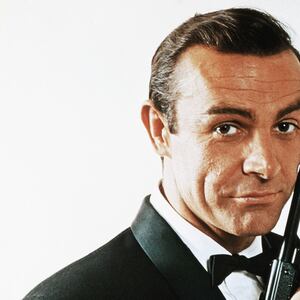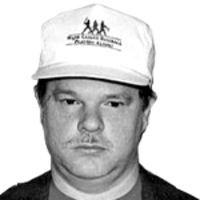Anthony Burgess called it right in 1962 when he predicted that James Bond “is likely to end up as one of the great twentieth-century myths.” Bond, Burgess thought, was “as universal as Sherlock Holmes… And he is a fuller man than Holmes: he loves women.”
Now, in the twenty-first century, there’s a strong possibility that the next James Bond may be a woman—or if Bond is not a she, then she at least may be a 007. Lashana Lynch, after all, plays a “00” agent in No Time to Die, and with Daniel Craig gone, who’s to say she won’t get a promotion? (Maybe Phoebe Waller-Bridge can write the whole script.) Or are we ready for a Black Bond—why not? Former NFL star Bernie Casey was in Never Say Never Again (1983), and Jeffrey Wright has played in three Bond films beginning with Casino Royale (2006)—and why not Idris Elba?
Joe Rogen asked rhetorically on his podcast, “Where would he [a Black Bond| be able to hide?” The answer is in just about every James Bond movie ever made, where a Black man would be no more conspicuous than a white Englishman, such as the Jamaica of Dr. No (1962), the Harlem and New Orleans of Live and Let Die (1973), or even the Tokyo of You Only Live Twice (1967).
More to the point, Bond is surely the most un-secret agent imaginable. Arriving at the hotel in Casino Royale, he notifies his enemy by checking in with his real name. The KGB in From Russia With Love (1963) know him so well they construct a detailed plan just to destroy him. In You Only Live Twice his foes know him simply by the kind of gun he carries (of course, a Walther PPK). And in Diamonds Are Forever (1971) a character who thinks 007 has been offed says, “You just killed James Bond! Don’t you know who that is?”
Bond is so well-known that when he disappears in one book, his boss, M, writes his obit for The Times of London. In the last Fleming novel, The Man With the Golden Gun (1965), Bond declines an offer of knighthood from the Crown, a designation that would certainly hamstring undercover work. “Bond… Sir James Bond—no ring to that.” He regards himself as “merely a Scottish peasant... I just refuse to call myself Sir James Bond. I would laugh at myself every time I looked in the mirror to shave.” Another Scot, Sir Sean Connery, had no such qualms.
Every time Bond arrives in a foreign country, he announces himself with the most famous introduction in movies: “Bond. James Bond.” (No. 22 of AFI’s top one hundred movie quotes.)
But then, Bond was never a secret agent, and he certainly wasn’t ever a spy. Kingsley Amis, one of Fleming’s biggest fans, called Bond “a medium-grade civil servant,” which is probably correct if you understand that Amis meant civil servant as a euphemism for “counter-spy.” He was conceived as a cross between the commandoes Fleming had known while working for the intelligence services during World War II and a trained assassin, a killer of spies. Why else would he be licensed by his government to kill?
Fleming’s Bond chafed at the load of paperwork he was required to complete after each assignment, and unlike his cinematic counterpart, whose budget for sports cars, rocket-powered backpacks, and speed boats, to say nothing of tuxedos and martinis, would have exceeded the entire defense budget of the British government, was always resentful of his lack of funding. In You Only Live Twice he apologizes to Tiger Tanaka (head of the Japanese secret service) for his meager expense account: “Under ten million pounds a year doesn’t go far when there is the whole world to cover.”
In From Russia With Love, he ruefully compares his own arsenal with that of his Soviet rival. “If only,” he laments, “his cigarette had been a trick one—magnesium flare, or something he could throw in the man’s face! If only his Service went in for those explosive toys!” If only. In the eighth full-length Bond book, Thunderball (1961), he envies CIA agents for “the excellence of their equipment, and he had no false pride about borrowing from them.”
The Bond of Fleming’s books may not be ordinary but he’s close. He is formidable and survives and eventually prevails because of his courage, quick wits, and resourcefulness. His KGB file calls him an “all-round athlete; expert pistol shot, boxer, knife-thrower.” He proves to be “a capable driver, pilot, swimmer, and demolitions expert.” We’re also told that he knows “the basic holds of judo. In general, fights with tenacity and has a high tolerance of pain.” Lucky for him because in the books he is tortured by professionals, not the comic book supervillains of the movies who want to explain their plans to him and alert him to the self-destruct button on their erector-set doom machines.
Unlike the movie Bond, in many of the books James is overmatched by his foes. The fight between Sean Connery’s Bond and Robert Shaw’s psychopath Irish-born, Russian-trained killer, Red Grant, on the Orient Express in From Russia With Love may be the ugliest and most realistic fight in movie history. The Bond in the book though, despite his extensive training “had no illusions about being able to beat this terrific man in unarmed combat. A stab of his knife has to be decisive.”
Fleming liked this quote from Sir Isaac Newton: “My powers are ordinary. Only my application brings me success.” The same could be said of his Bond.
Apparently not even Bond’s looks are extraordinary. In the early ’60s, when plans were made for turning Fleming’s books into films, Fleming immediately leaned toward matinee idol types like Roger Moore. (Fleming also liked the idea of David Niven as Bond—not so odd a choice, given that Niven was trained as commando in World War II.) He disliked Sean Connery, who reminded him of “a lorry driver,” but changed his mind when his secretary convinced him that Connery “had something.” Several years before, though, Fleming confessed that he thought his creation could be played by songwriter and musician Hoagy Carmichael. Perhaps not coincidentally, Fleming’s wife told him that she thought he resembled Carmichael.
On paper, James Bond was about 6 feet tall, or at least that’s the height SMERSH, the KGB’s murder arm, estimated him to be: “183 centimeters, weight 76 kilograms, slim build.” Or 6 feet and 168 pounds. He was shorter than every actor who played him until Daniel Craig, 5-foot-10, took the role.
The truth is that after 14 books by Fleming, 40 authorized (by the Fleming estate) Bond books, and more than two dozen films, we know very little about James Bond. It took half a century for the Bond movies to catch up to his lineage. The most popular hero in the history of British fiction had not a drop of English blood; both parents, as Fleming divulged in an interview shortly before his death, were Scots. In all Fleming’s novels, just about all we know of Bond’s background is contained in M’s obit for him in You Only Live Twice and the intel compiled in the KGB dossier in From Russia With Love. Screenwriters for Casino Royale (among them Paul Haggis) cleverly drew from these sources for the ego-deflating character assessment delivered by the marvelous Eva Green on the train to Montenegro.
For that matter, Fleming never made it clear where Bond’s 007 classification came from. There are several theories, and I like all of them. Fleming’s best biographer, Andrew Lycett, in Ian Fleming: The Man behind James Bond (1995) offers convincing evidence that “Bond’s code number was based on the German diplomatic code 0070 used to send the Zimmerman telegram”—the 1917 German plan to attack the U.S. from Mexico. Another theory is that Elizabeth I’s spy, John Dee (presumably the first agent of Her Majesty’s Secret Service) signed his report on Spanish activities with “007.”
My favorite, though, is that Fleming named Bond after the talking train in Rudyard Kipling’s story that carried Westerners into the India of the British empire. The story is named for the train’s number: .007.
In The Man Who Saved Britain: A Personal Journey into the Disturbing World of James Bond (2006), Simon Winder argues that Fleming’s novels would fade, to be regarded at best as mere addenda to the Bond films. I argue the opposite. Most of the Bond movies—including all the Roger Moores and even a couple of Connerys—are forgettable. The three best of them all—On Her Majesty’s Secret Service, From Russia with Love, and Casino Royale—work because they never stray far from Fleming’s books.
Fleming’s Bond is an avatar of a time still strongly felt but now only dimly remembered. He was born a Cold War warrior who ferreted out and killed Communist agents such as Auric Goldfinger and Le Chiffre of Casino Royale. Early in the ’60s Fleming sensed a thaw in East-West relations and decided to stop sticking it to the Russians and created an international crime organization, SPECTRE or Special Executive for Counterintelligence, Terrorism, Revenge, and Extortion (Did they copyright the acronym? Have company cards printed up?). But even SPECTRE wasn’t needed for long to supply the villainy. There’s all sorts of ways to update Bond plots, as Casino Royale proves. A Communist paymaster when the first Bond book was published in 1953 was reimagined 53 years later in the second version of the film as a financier of terrorists. Clever and convincing.
Fleming attracted the most stylish roster of literary groupies of any genre writer since Raymond Chandler, a Fleming booster and friend who wrote an introduction to the first British edition of Casino Royale. Kingsley Amis paid homage with a fun little book, The James Bond Dossier (1965). Anthony Burgess wrote an introduction for British editions of Bond paperbacks. Cyril Connelly wrote a loving parody of Fleming in a 1963 short story, Bond Strikes Camp. Other well known fans included Christopher Isherwood, Elizabeth Bowen, and even President John F. Kennedy (who in a 1961 interview named From Russia With Love as one of his 10 favorite books along with Stendhal’s The Scarlet and the Black). Fleming was particularly proud of JFK’s endorsement; we hope Fleming died without knowing that another fan checked several Bond books out of a New Orleans public library in the early 1960s.
What’s curious is that Fleming never engendered an heir. Several novelists, much better writers than Fleming himself, have failed to bring the literary Bond back to life. Amis, with Colonel Sun (1968), Sebastian Faulks in Devil May Care (2008), William Boyd with Solo (2013), and Anthony Horowitz’s Forever and A Day (2018) have created Bond’s adventures and are pleasurable reads, but whether they set him in the 1950s or 1960s or try to drag him karate-kicking and screaming into the 21st century, none have quite succeeded in capturing Fleming’s same air of trashy elegance.
Can a genre writer be a genius? Or is that like asking who is the world’s tallest midget? Surely there will always be a place in our pantheon for a hero who will kill and die for his country. And by hero I mean in the ancient Greek tradition, defined by Britannica Online as “a revered character in ancient poetry living by a continually flawed personal honor code.”
We could use a new Bond, and he must be born on paper before his super-projection can appear on screen.


